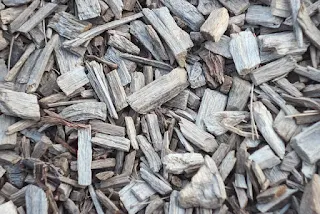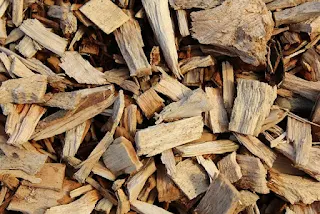What is Mulch???
Mulch is a layer of material applied to the surface of the soil, primarily to improve the health of the soil and the plants growing in it. It can be made from a wide variety of organic and inorganic materials, each with their own unique properties and benefits.
Organic mulches are derived from plant materials, such as bark, wood chips, straw, leaves, grass clippings, or compost. As organic mulches break down over time, they release nutrients into the soil, enriching it and improving its structure. Inorganic mulches include materials like gravel, pebbles, crushed stone, or recycled rubber. These types of mulches do not break down and provide nutrients to the soil but can serve other purposes like weed suppression and aesthetic appeal.
What is Mulch Used For?
Mulch serves several functions in gardening and landscaping:
Weed suppression
Weed suppression is an essential benefit of using mulch in gardens and landscaped areas. Weeds compete with desired plants for nutrients, water, and sunlight, which can stunt their growth and even cause them to die. By suppressing weeds, mulch promotes the health and vigor of the plants you want to grow.
Mulch works as a weed suppressant by creating a physical barrier that blocks sunlight from reaching the soil surface. When weed seeds are in the soil, they need sunlight to germinate and grow. By preventing sunlight from reaching the soil, mulch inhibits the germination process, stopping weeds from sprouting and taking hold.
Additionally, mulch can also make it more difficult for weed seeds that do manage to germinate to push through the mulch layer and reach the surface. This further impedes weed growth and helps maintain a cleaner, weed-free garden or landscape.
Using mulch for weed suppression has several advantages over other weed control methods:
- Reduced reliance on chemicals: By inhibiting weed growth through physical means, mulch reduces the need for chemical herbicides. This can have positive environmental implications, as chemical herbicides can contaminate water sources, harm non-target plants and animals, and pose risks to human health.
- Cost-effective: Mulching can be a more cost-effective method of weed control compared to chemical or manual removal methods, as it requires less frequent application and labor.
- Soil health improvement: Organic mulches decompose over time, enriching the soil with nutrients and improving its structure. This promotes healthy plant growth and can make it more difficult for weeds to establish themselves in the long term.
- Aesthetic appeal: A layer of mulch can provide a neat, finished appearance to gardens and landscaped areas, making it an attractive option for weed control.
Overall, using mulch for weed suppression can lead to healthier plants, a cleaner garden or landscape, and reduced reliance on chemical weed control methods.
Moisture retention
Moisture retention is a key benefit of using mulch in gardens and landscaped areas. Proper soil moisture is critical for plant health, as it affects nutrient availability and uptake, root development, and overall plant growth. Mulch plays an important role in helping to maintain optimal soil moisture levels by minimizing water loss due to evaporation.
When the sun's rays hit the soil, they cause water to evaporate from the soil surface. By covering the soil with a layer of mulch, you create an insulating barrier that reduces the direct impact of the sun's rays on the soil. This in turn slows down the rate of evaporation, helping to retain more moisture within the soil.Furthermore, mulch can also help to reduce runoff during rain or irrigation events. This is because the mulch layer absorbs and holds water, allowing it to gradually seep into the soil rather than running off the surface. This ensures that more water is available to the plants' roots.
The benefits of improved moisture retention with mulch include:
- Water conservation: Less frequent watering is required when mulch is used, which helps conserve water resources, especially in areas where water is scarce or usage is restricted.
- Time and effort savings: With reduced watering requirements, gardeners and landscapers can save time and effort spent on watering plants, making maintenance more manageable.
- Improved plant health: Consistent soil moisture levels create a more favorable environment for plants to thrive, promoting healthier root systems and overall plant growth.
- Reduced water stress: In periods of drought or high temperatures, mulch can help to alleviate water stress on plants by maintaining more consistent soil moisture levels.
- Cost savings: By decreasing the need for frequent watering, mulch can lead to savings on water bills and the cost of irrigation systems.
Temperature regulation
Temperature regulation is another essential benefit of using mulch in gardens and landscaped areas. Soil temperature plays a significant role in plant health, affecting root development, nutrient uptake, and overall growth. Mulch helps to moderate soil temperature by acting as an insulating layer on the soil surface, creating a more stable environment for plants.
In the summer, when temperatures are high, mulch prevents the soil from heating up too much by shading it from direct sunlight. This helps to keep the soil cooler, which can be beneficial for plant roots, as excessively high soil temperatures can damage roots and hinder nutrient and water uptake. Cooler soil temperatures also reduce the stress on plants, allowing them to focus on growth and reproduction.
In the winter, mulch helps to maintain warmer soil temperatures by insulating the soil and reducing heat loss. This can be especially important for protecting plant roots from freezing temperatures, which can cause damage or even kill the plant. In some cases, a layer of mulch can prevent the ground from freezing entirely, allowing plants to continue to take up water and nutrients throughout the winter.
The benefits of improved temperature regulation with mulch include:
- Enhanced plant growth: By creating a more stable temperature environment, mulch promotes healthier root systems and overall plant growth, leading to more vigorous plants.
- Extended growing season: In some cases, mulch can help extend the growing season by protecting plant roots from freezing temperatures and allowing for earlier planting or later harvests.
- Improved nutrient uptake: Optimal soil temperatures facilitate better nutrient uptake by plant roots, contributing to healthier plants and better yields.
- Protection from temperature extremes: Mulch can protect plants from damage caused by extreme temperature fluctuations, which can be especially important for sensitive or newly planted specimens.
- Reduced water evaporation: As mentioned earlier, cooler soil temperatures during the summer months can help reduce water evaporation, further contributing to moisture retention.
Erosion control
Erosion control is an important benefit of using mulch in gardens and landscaped areas. Soil erosion occurs when soil particles are detached and transported by water or wind. It can lead to the loss of valuable topsoil, which is rich in nutrients and essential for plant growth. Erosion can also cause sedimentation in nearby water bodies, negatively impacting water quality and aquatic habitats.
Mulch helps control soil erosion in several ways:
- Protection from rain impact: When raindrops hit the soil surface, they can dislodge soil particles and cause them to splash or be washed away. By covering the soil with a layer of mulch, the impact of raindrops is absorbed and dispersed, reducing the potential for soil displacement.
- Slowing down water flow: Mulch can slow down the flow of water across the soil surface, which reduces the potential for runoff and the subsequent erosion of soil particles. This is especially important in areas with slopes or where heavy rainfall events are common.
- Wind protection: In areas where wind erosion is a concern, mulch acts as a barrier that reduces the movement of soil particles by wind. By covering the soil surface and reducing the amount of exposed soil, mulch helps prevent wind from picking up and carrying away soil particles.
- Increased soil moisture retention: As mentioned earlier, mulch can help retain soil moisture by reducing evaporation. When soil is moist, it is less susceptible to erosion, as the water binds soil particles together, making it more difficult for them to be washed or blown away.
- Improved soil structure: Organic mulches decompose over time, contributing organic matter to the soil. This can improve soil structure by increasing aggregation and stability, making the soil more resistant to erosion.
The benefits of using mulch for erosion control include:
- Preservation of topsoil: By reducing erosion, mulch helps to preserve valuable topsoil, maintaining soil fertility and promoting healthier plant growth.
- Protection of water quality: By preventing soil erosion, mulch can help reduce sedimentation in nearby water bodies, protecting aquatic habitats and water quality.
- Improved landscape stability: Mulch can help stabilize slopes and prevent the formation of gullies or other signs of erosion, maintaining the integrity and appearance of the landscape.
- Reduced maintenance: Erosion control can reduce the need for soil replacement, regrading, or other costly and labor-intensive maintenance activities.
Aesthetic appeal
Hey if done right, it can just look nice! Nothing wrong with that!Mulch and No Lawns
The no lawns movement advocates for the replacement of traditional, water-intensive lawns with more sustainable, low-maintenance, and environmentally friendly alternatives. Mulch is a good choice for the no lawns movement in some situations because:
- Reduced maintenance: Mulching can significantly reduce the need for watering, mowing, and weed control, resulting in lower maintenance efforts and costs.
- Water conservation: By promoting moisture retention and reducing evaporation, mulch helps conserve water resources, making it a more sustainable choice compared to conventional lawns.
- Biodiversity promotion: Replacing lawns with mulched areas and native plants can create habitats that support a diverse range of insects, birds, and other wildlife, promoting biodiversity.
- Reduced chemical use: The use of mulch for weed control can help reduce the need for chemical herbicides, which can be harmful to the environment and human health.
- Carbon sequestration: Organic mulches can store carbon as they decompose, contributing to carbon sequestration and helping to mitigate climate change.




No comments:
Post a Comment